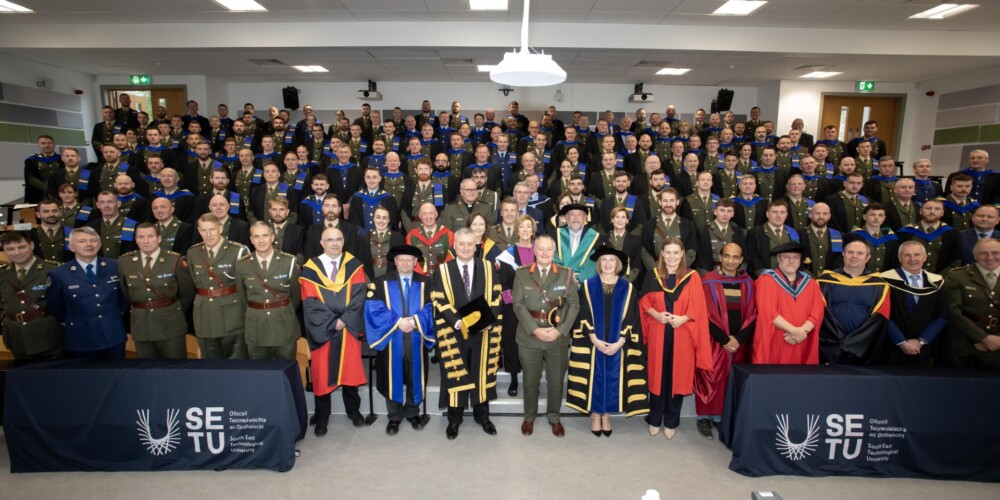
SETU and the Defence Forces: Education pathways for enlisted personnel
Who we are
South East Technological University (SETU) is Ireland’s youngest university and the only university in the South East of Ireland. With campuses across the region in Carlow, Waterford and Wexford, along with a presence in Kilkenny and Wicklow, SETU is a regional ‘anchor’ institution; it is an important contributor to the development of the regional knowledge economy, a regional employer of significant scale, and a regional thought and social and cultural leader.
The Defence Forces (Óglaigh na hÉireann) are the armed forces of Ireland; they encompass the Army, Air Corps, Naval Service, and Reserve Defence Forces.
What we did
SETU and the Defence Forces established a partnership in 2004, with one of SETU’s legacy institutions initially offering a BEng in Electronic Engineering (Military Communications Systems) to communications and information services personnel.
In 2010/11, SETU and the Defence Forces collaboratively developed the Leadership, Management and Defence Studies (LMDS) suite of programmes. This suite of programmes validated in 2012 allows Defence Forces enlisted personnel to have their career learning recognised through external accreditation. The ECT credits built up through the programme ensures that personnel have qualifications that enhance their careers within the military while also providing them with recognised qualifications on leaving the Defence Forces.
Students start with the 120 credit Level 6 Higher Certificate in Arts in Leadership, Management and Defence Studies. They can then progress to complete the 30 credit Level 7 Minor Award – Certificate in Arts in Leadership, Management and Defence Studies. By taking an additional 30 credits, learners can progress to one of two Level 7 Ordinary Degree options: BA in Leadership, Management and Defence Studies, or BA in Leadership, Management and Defence Studies (Logistics).
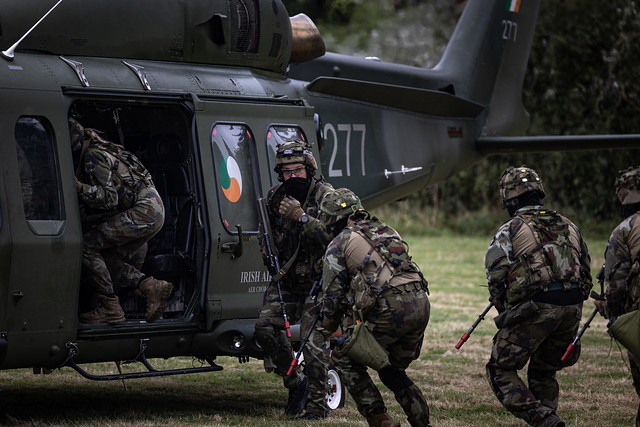
Figure 1: Defence Forces personnel in Training
An alternative route was also developed for non-commissioned officers (NCOs), both serving and retired, who completed their career course prior to 2012. These NCOs can achieve one of the LMDS qualifications through the completion of a Recognition of Prior Learning (RPL) portfolio and dissertation.
SETU offers other development opportunities to military personnel. For example, a number of places on the Masters in Teaching and Learning are offered to Defence Forces personnel each year. This prepares them to support and deliver on the LMDS programmes. Defence Forces personnel are also included on teaching and learning seminars, quality assurance workshops and other University events.
The partnership also involves the reciprocal delivery of lectures and presentations to the wider SETU student body by Defence Forces personnel in areas such as Mechanical Engineering, Law, Leadership and Management, Human Resource Management, Logistics, IT Forensics and Sports Science.
The LMDS programmes also facilitate the development of a community of practice among learners participating in various locations, creating a sustainable learning community which can continue beyond the completion of the programmes of study.
Ensuring Effectiveness
Since the start of the collaboration, robust internal academic governance structures have been created, including the establishment of a Defence Forces Academic Council and the appointment of a Defence Forces Registrar, and key quality assurance processes have been developed and implemented. A number of other practices have also been established in support of academic quality:
- Completion of the MA Teaching and Learning in SETU by Defence Forces personnel involved in the development, delivery, management and review of education and training.
- Joint module/programme visits by the Quality Assurance and Collaborations Officer, SETU and the Defence Forces Registrar.
- SETU involvement in annual training and education inspections on chosen programmes.
- Establishment of working groups arising from the Defence Forces Academic Council.
- Joint module and programme review.
- Defence Forces staff attendance at teaching and learning seminars.
- SETU support of Technology Enhanced Learning in the Defence Forces and assisting in the establishment of the Defence Forces Learning Management System and content creation.
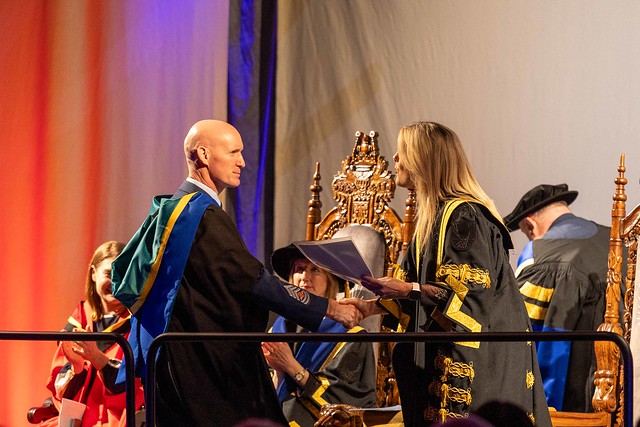
Figure 2: Air Corps graduate from BA in Leadership, Management and Defence Studies (Logistics) receiving his degree from Pro-Chancellor Cynthia Ní Mhurchú January 2024
Impact Achieved
The accredited, bespoke education programmes provided through this collaborative initiative offer enlisted personnel access to higher education, giving individuals opportunities to participate that they would not otherwise have, and support public service reform by ensuring staff are well-equipped for their roles now and into the future.
Defence Forces personnel
The uptake by Defence Forces personnel of a place on one of the LMDS programmes is 87.5% of eligible personnel since 2012. Over 2,000 awards from Leadership, Management and Defence Studies (LMDS) programmes have been conferred onto Defence Forces personnel (Table 1), with over half of these awards being Higher Certificates and 17% being a BA degree (Figure 1).
Table 1. Graduates on LMDS programmes 2012/2013 to 2022/2023
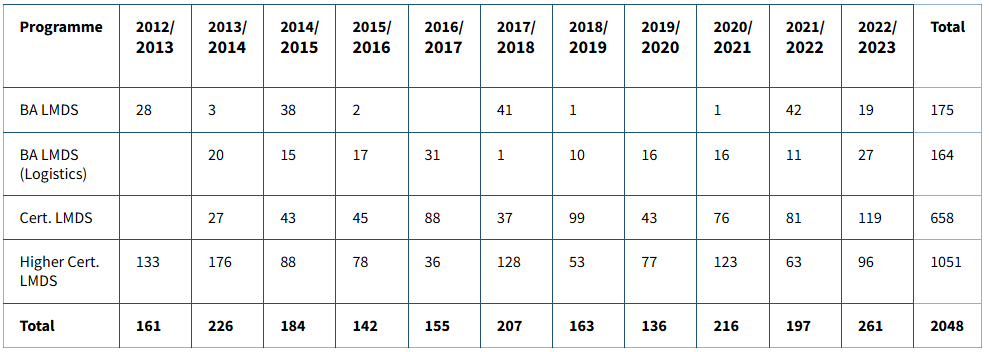

Figure 1. Breakdown of LMDS graduates by programme
There is strong evidence of graduate progression from LMDS certificates to more advanced programmes with over 200 Defence Forces personnel completing programmes at NFQ Levels 7 to 9 since 2012, in areas including Communications and Information Services, Military Engineering Management and Weapons, Ordnance and Munitions Engineering, Teaching and Learning, and Supply Chain Management. This illustrates that the provision of the LMDS suite creates educational pathways for individuals.
The LMDS suite of programmes offers the first formal higher education opportunity for many of the Defence Forces students. Through this collaboration, a large number of mature first-generation learners and their families and communities are empowered by undertaking and completing studies. The impact of the LMDS programmes, including the application of Recognition of Prior Learning (RPL), is best articulated by those who have completed one of the programmes:
“The fact that I left school at fifteen and never had the opportunity to complete my leaving cert was not a barrier to successfully achieving my Bachelor of Arts in Leadership, Management and Defence Studies Programme. […] Your service counts and the RPL programme adds value to your service. Having completed the RPL programme has given me the option to continue serving society in my retirement. RPL will give you the opportunity to achieve the BA and the BA is your passport into civilian employment and or to further education if that is your choice.” (Retired Regimental Sergeant Major, Irish Defence Forces)
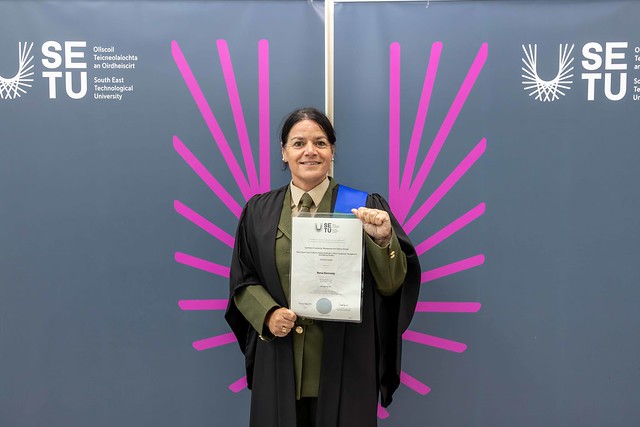
Figure 3: Sergeant Rena Kennedy-Killeen, Defence Forces LMDS graduate 2023
SETU and the Defence Forces
This collaboration has benefitted both the Defence Forces and the University. The cross pollination of ideas between Defence Forces personnel and civilian SETU staff and students has brought new ideas into both organisations. SETU has refined and enhanced its academic governance structures and practices through accrediting Defence Forces programmes, tested and enhanced its approach to work-based learning and RPL, and developed its capability in delivering large-scale initiatives within the organisations.
For the Defence Forces, the ability to attract and retain staff, to upskill and reskill staff, to enhance the overall educational profile of the organisation, and to offer accredited training that opens up additional educational pathways to employees has been of demonstrable benefit, contributing to the achievement of the Defence Forces’ strategic objective to create the “optimum personnel and skills profile to address all defence requirements.”
While militaries globally offer third level education programmes to ‘commissioned officers’ (higher rank), Ireland is one of the only known countries to offer higher education programmes to enlisted Defence Forces personnel and now serves as an exemplar internationally.
Public service reform
In addition to working with the Defence Forces, SETU also collaborates, using a similar model, with the Irish Prison Service, the Emergency Services (Dublin Fire Brigade and the National Ambulance Services), and the Local Authority Services National Training Group.
SETU’s partnership with the Defence Forces also contributes to national policy objectives in relation to staff upskilling and reskilling within the Irish public service and was recognised by Our Public Sector 2020 and the Department of Education and Skills in 2019 as a model for engagement between HEIs and the wider public sector. SETU hosted a major public sector conference on collaboration and included discussions on building a collaborative relationship; recognising life experience in learning; recognising public service core skills and work-based learning; and real lifelong learning.
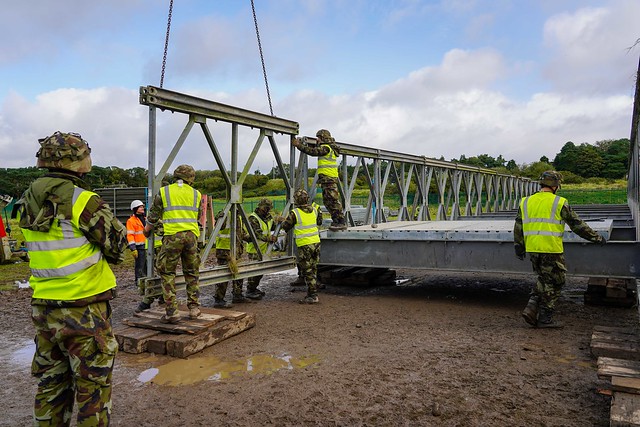
Figure 4: Defence Forces Corps of Engineers students on Master of Engineering complete a bridge build
What we learned
SETU collaborates with the Defence Forces to provide accredited, bespoke education programmes that address individual skills and organisational human resource needs. Through the development of the partnership, there have been many learnings.
There are many differences between academic and military requirements, systems and language. This was evidenced in higher education quality assurance requirements (external examiners, assessment, procedures, evaluations), the development of relevant programme and module content, the development of procedures and processes for the recognition of prior learning (RPL), and for giving credit to Work-Based Learning.
As the partnership has matured, these differences have been resolved through dialogue and training. In many other contexts involving public bodies, similar instances may occur. Engagement at strategic and operational (including quality assurance and enhancement) level is vital to enabling success.
The approaches taken are expandable across the Irish public service and demonstrate that large public service organisations can benefit from working with HEIs to facilitate access to and participation in higher education amongst its employees.